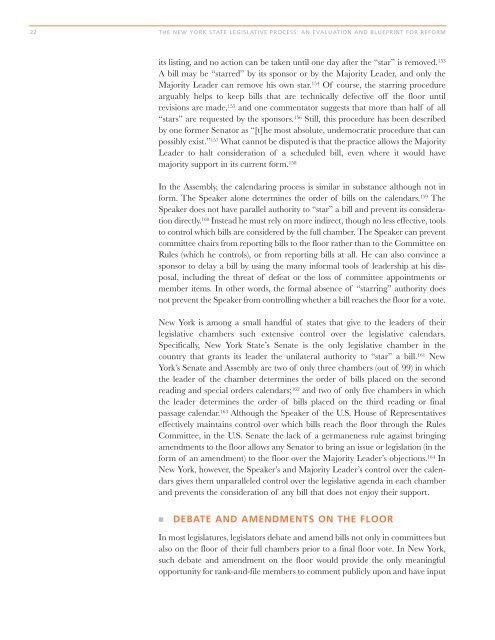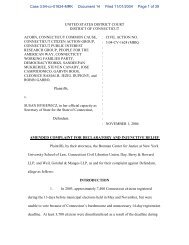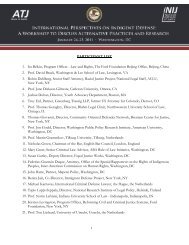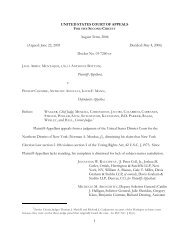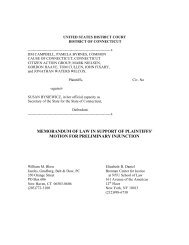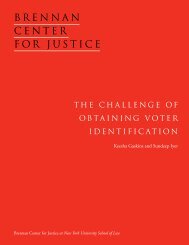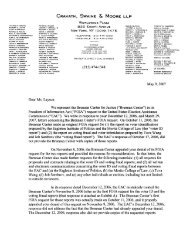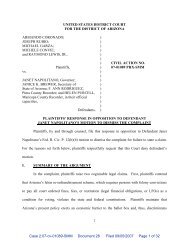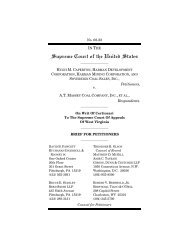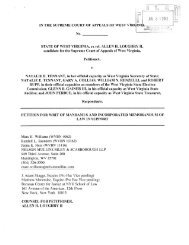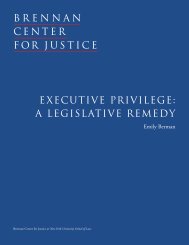THE NEW YORK STATE LEGISLATIVE PROCESS: AN ...
THE NEW YORK STATE LEGISLATIVE PROCESS: AN ...
THE NEW YORK STATE LEGISLATIVE PROCESS: AN ...
Create successful ePaper yourself
Turn your PDF publications into a flip-book with our unique Google optimized e-Paper software.
22 <strong>THE</strong> <strong>NEW</strong> <strong>YORK</strong> <strong>STATE</strong> <strong>LEGISLATIVE</strong> <strong>PROCESS</strong>: <strong>AN</strong> EVALUATION <strong>AN</strong>D BLUEPRINT FOR REFORM<br />
its listing, and no action can be taken until one day after the “star” is removed. 153<br />
A bill may be “starred” by its sponsor or by the Majority Leader, and only the<br />
Majority Leader can remove his own star. 154 Of course, the starring procedure<br />
arguably helps to keep bills that are technically defective off the floor until<br />
revisions are made, 155 and one commentator suggests that more than half of all<br />
“stars” are requested by the sponsors. 156 Still, this procedure has been described<br />
by one former Senator as “[t]he most absolute, undemocratic procedure that can<br />
possibly exist.” 157 What cannot be disputed is that the practice allows the Majority<br />
Leader to halt consideration of a scheduled bill, even where it would have<br />
majority support in its current form. 158<br />
In the Assembly, the calendaring process is similar in substance although not in<br />
form. The Speaker alone determines the order of bills on the calendars. 159 The<br />
Speaker does not have parallel authority to “star” a bill and prevent its consideration<br />
directly. 160 Instead he must rely on more indirect, though no less effective, tools<br />
to control which bills are considered by the full chamber. The Speaker can prevent<br />
committee chairs from reporting bills to the floor rather than to the Committee on<br />
Rules (which he controls), or from reporting bills at all. He can also convince a<br />
sponsor to delay a bill by using the many informal tools of leadership at his disposal,<br />
including the threat of defeat or the loss of committee appointments or<br />
member items. In other words, the formal absence of “starring” authority does<br />
not prevent the Speaker from controlling whether a bill reaches the floor for a vote.<br />
New York is among a small handful of states that give to the leaders of their<br />
legislative chambers such extensive control over the legislative calendars.<br />
Specifically, New York State’s Senate is the only legislative chamber in the<br />
country that grants its leader the unilateral authority to “star” a bill. 161 New<br />
York’s Senate and Assembly are two of only three chambers (out of 99) in which<br />
the leader of the chamber determines the order of bills placed on the second<br />
reading and special orders calendars; 162 and two of only five chambers in which<br />
the leader determines the order of bills placed on the third reading or final<br />
passage calendar. 163 Although the Speaker of the U.S. House of Representatives<br />
effectively maintains control over which bills reach the floor through the Rules<br />
Committee, in the U.S. Senate the lack of a germaneness rule against bringing<br />
amendments to the floor allows any Senator to bring an issue or legislation (in the<br />
form of an amendment) to the floor over the Majority Leader’s objections. 164 In<br />
New York, however, the Speaker’s and Majority Leader’s control over the calendars<br />
gives them unparalleled control over the legislative agenda in each chamber<br />
and prevents the consideration of any bill that does not enjoy their support.<br />
■ DEBATE <strong>AN</strong>D AMENDMENTS ON <strong>THE</strong> FLOOR<br />
In most legislatures, legislators debate and amend bills not only in committees but<br />
also on the floor of their full chambers prior to a final floor vote. In New York,<br />
such debate and amendment on the floor would provide the only meaningful<br />
opportunity for rank-and-file members to comment publicly upon and have input


